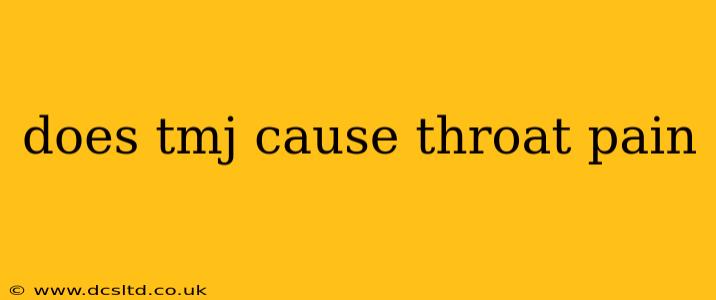Temporomandibular joint (TMJ) disorders, affecting the jaw joint, can surprisingly lead to a range of symptoms beyond jaw pain. Many sufferers experience throat pain as a seemingly unrelated yet significant consequence. This article explores the potential link between TMJ and throat pain, explaining the mechanisms, common symptoms, and available treatment options.
How Can TMJ Affect My Throat?
The connection between TMJ and throat pain isn't always direct, but rather stems from the intricate network of muscles and nerves in the head and neck. When the TMJ is misaligned or experiencing inflammation, it can trigger a chain reaction affecting surrounding structures. Here's how:
- Muscle Tension: TMJ disorders often involve the muscles of mastication (chewing) and other muscles around the jaw, including those connecting to the throat. Chronic tension in these muscles can lead to referred pain in the throat, feeling like a sore throat or tightness.
- Nerve Irritation: The trigeminal nerve, a major cranial nerve responsible for sensation in the face and jaw, also innervates parts of the throat. TMJ dysfunction can irritate this nerve, resulting in pain radiating to the throat.
- Postural Changes: TMJ problems can alter head posture, leading to strain on neck and throat muscles. This chronic strain contributes to discomfort in the throat.
- Inflammation: Inflammation within the TMJ joint can sometimes spread to nearby tissues, including throat muscles and structures.
What are the Symptoms of TMJ-Related Throat Pain?
Throat pain associated with TMJ might manifest in several ways:
- Sore Throat: A persistent or intermittent feeling of soreness in the throat, similar to a common cold, but without other cold symptoms.
- Throat Tightness: A sensation of constriction or tightness in the throat, making swallowing difficult.
- Difficulty Swallowing (Dysphagia): In some cases, severe TMJ issues can lead to difficulty swallowing.
- Ear Pain: TMJ often presents alongside ear pain, as these areas share close anatomical connections.
- Jaw Pain: The hallmark symptom of TMJ is pain in the jaw joint itself.
Can TMJ Cause Throat Pain and Difficulty Swallowing?
Yes, while uncommon, severe TMJ dysfunction can indeed cause difficulty swallowing, a condition known as dysphagia. The underlying mechanisms usually involve significant muscle tension and potentially nerve impingement affecting the muscles responsible for swallowing.
What Other Symptoms Are Associated with TMJ?
Besides throat pain, various other symptoms can accompany TMJ disorders:
- Jaw Pain and Clicking: This is often the most noticeable symptom.
- Headaches: TMJ frequently causes headaches, particularly tension headaches.
- Earaches: Pain in the ear is a common TMJ-related symptom.
- Neck Pain: Stiffness and pain in the neck are often present.
- Facial Pain: Pain or discomfort in the face, particularly around the jaw and temples.
How is TMJ-Related Throat Pain Diagnosed?
Diagnosing TMJ-related throat pain requires a thorough evaluation by a healthcare professional, often involving:
- Physical Examination: The doctor will assess your jaw range of motion, palpate the jaw muscles, and check for tenderness.
- Medical History: A detailed account of your symptoms and medical history is crucial.
- Imaging Tests: X-rays or other imaging techniques might be used to examine the TMJ joint.
How is TMJ-Related Throat Pain Treated?
Treatment options for TMJ-related throat pain focus on managing the underlying TMJ disorder. Common approaches include:
- Pain Relief Medication: Over-the-counter pain relievers like ibuprofen or acetaminophen can help alleviate pain and inflammation.
- Muscle Relaxants: These medications can help reduce muscle tension and spasms.
- Physical Therapy: Exercises and stretches designed to improve jaw mobility and reduce muscle tension.
- Splints or Mouthguards: These devices help stabilize the jaw and reduce stress on the joint.
- Lifestyle Modifications: Changes in diet (avoiding hard or chewy foods), posture, and stress management techniques.
- Injections: Corticosteroid injections may be used to reduce inflammation in severe cases.
- Surgery: In rare instances, surgery may be necessary for severe, intractable cases.
This information is for general knowledge and does not constitute medical advice. If you experience throat pain or other symptoms that you suspect might be related to TMJ, consult a doctor or dentist for proper diagnosis and treatment. Early intervention can often prevent the condition from worsening and improve your overall quality of life.
